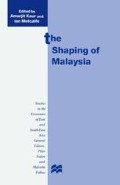Abstract
The political system practised by Malaysia’s multi-racial society since its formation as a modern state in 1963 has been a fairly complex but successful one. It is a parliamentary democracy, which functions within the framework of constitutional monarchies and a federal structure. The parliamentary opposition is officially recognised, but is so small in size and so weak and disunited that it has no hope of ever being an alternative government. The system reflects the political dominance of the Malays and their control of the administration as indigenous masters of the country. The Malaysian Constitution guarantees ‘special rights’ for the Malays, or bumiputra (sons of the soil), which are also extended to the ‘natives of Borneo’. These rights had been agreed to by the Chinese and Indian leaders in 1955 as part of an ‘historic bargain’ with Malay leaders prior to Malaya’s independence in 1957. Malaya joined with Singapore, Sarawak and Sabah in 1963 to form Malaysia, but Singapore left the federation in 1965. Under the ‘bargain’, in return for citizenship, freedom of worship and the right to use their own languages, the non-Malays accepted the ‘special position’ of the Malays; Malay as the national language; Islam as the official religion; and the Malay rulers as constitutional monarchs.
Access this chapter
Tax calculation will be finalised at checkout
Purchases are for personal use only
Preview
Unable to display preview. Download preview PDF.
References
R. Allen, Malaysia Prospect and Retrospect: The impact and aftermath of colonial rule (Kuala Lumpur: Oxford University Press, 1968) p. 277.
C.A. Vlieland (comp.), A Report on the 1931 Census (HMSO:London, 1932); see also M.V. Del Tufo, Malaya: A Report on the 1947 Cenus of Population (London: HMSO, 1949) pp. 40, 84–5.
Khoo Kay Kim, ‘The First Indian Members of the Straits and Federal Legislative Councils’, Malaysia in History, XVI/1 (June 1973): 3–4.
C.R. Abraham, Divide and Rule: The Roots of Race Relations in Malaysia (Kuala Lumpur: Insan, 1997) p. 249.
W.R. Roff, The Origins of Malay Nationalism (Kuala Lumpur: University of Malaya Press, 1967) pp. 246–7.
Cheah Boon Kheng, Red Star Over Malaya (Singapore: Singapore University Press, 1983) pp. 230, 240.
J. de V. Allen, The Malayan Union (New Haven, Conn.: Yale Southeast Asian Studies, 1970) p. 50–5.
D.K. Mauzy, Barisan Nasional: Coalition Government in Malaysia (Kuala Lumpur: Maricans, 1983) p. 24.
ibid., p. 26.
R. Allen, Malaysia Prospect and Retrospect p. 281.
D.K. Mauzy, Barisan Nasional p. 143.
ibid., p. 144.
W. Shaw, Tun Razak and His Times (Kuala Lumpur: Longmans, 1977) p. 73.
D.K. Mauzy, Barisan Nasional pp. 146–7.
G. Means, Malaysian Politics: The Second Generation (Kuala Lumpur: Oxford University Press, 1991) pp. 97.
Husin Ali, Two Faces: (Detention Without Trial) (Kuala Lumpur: Insan, 1996) pp. 109–10.
Abdullah Ahmad, Tengku Abdul Rahman and Malaysia’s Foreign Policy 1963–1970 (Kuala Lumpur: Berita Publishing, 1985) p. 17.
ibid.
J.V. Morais, Mahathir: A Profile in Courage (Singapore: Eastern Universities Press, 1982) p. 29.
H.P. Lee, Constitutional Conflicts in Contemporary Malaysia (Kuala Lumpur: Oxford University Press, 1995) p. 37.
Hari Singh, ‘UMNO Leaders and Malay Rulers: The Erosion of a Special Relationship’, Pacific Affairs, 68, 2 (1995): 187–205.
Cheah Boon Kheng, ‘The Erosion of Ideological Hegemony and Royal Power and the Rise of Postwar Malay Nationalism’, Journal of Southeast Asian Studies, XIX, 1 (March 1988): 1–26.
See CARPA, Tangled Web: Dissent, Deterrence and the 27 October 1987 Crackdown in Malaysia (Kuala Lumpur: 1988) pp. xi–xiv.
Khoo Boo Teik, The Paradoxes of Mahathirism (Kuala Lumpur: Oxford University Press, 1995) p. 331.
ibid., p. 338.
Author information
Authors and Affiliations
Editor information
Editors and Affiliations
Copyright information
© 1999 Palgrave Macmillan, a division of Macmillan Publishers Limited
About this chapter
Cite this chapter
Kheng, C.B. (1999). Politics. In: Kaur, A., Metcalfe, I. (eds) The Shaping of Malaysia. Studies in the Economies of East and South-East Asia. Palgrave Macmillan, London. https://doi.org/10.1007/978-1-349-27079-8_6
Download citation
DOI: https://doi.org/10.1007/978-1-349-27079-8_6
Publisher Name: Palgrave Macmillan, London
Print ISBN: 978-1-349-27081-1
Online ISBN: 978-1-349-27079-8
eBook Packages: Palgrave Economics & Finance CollectionEconomics and Finance (R0)

